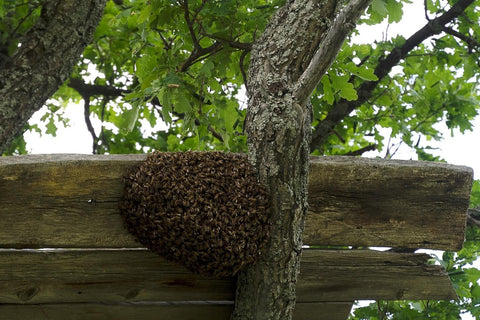The winter months bring us relief from being bugged by pests. While this is great, it still leaves us with an important question. Where do the bugs go? They don’t disappear with magic, but they do have a few tricks up their sleeves. Check out how bugs handle the chilly winter months.

Winter Blues
It’s important to understand why most bugs struggle in the winter. Bugs are exothermic, which means they aren’t capable of producing their own body heat. Their body temperature is regulated by environmental conditions. When the air gets colder, so do they. The biggest problem they face is freezing. If a bug can’t avoid freezing, it won’t survive. Some bugs are smart, though, and have found ways to outwit dropping temperatures. Check out how bugs survive in winter.
Migration

Certain bugs don’t even want to attempt to deal with winter conditions. Can you blame them? Instead, they pack their bags and head for warmer climates. This act is referred to as seasonal migration. The most well-known migrator is the monarch butterfly. Some species of dragonflies and moths also choose to leave before things get too cold. When they set out on their journey, they don’t let anything distract them. They avoid visiting plants and mating.
Teamwork

Some bugs work together to survive the drop in temperature. Bugs that live in colonies take advantage of their size. Bees group together, forming a ball in the comfort of their hive. The bees in the middle of the group will move their wings to generate heat. The outer layer of bees help to keep the ball insulated. Rotating positions keeps the bees warm and cozy. Ants behave similarly by clustering together to maintain their body heat. They also close off their tunnels to keep out chilly air. Bees and ants ensure that their queen is at the center of the group.
Diapause

Bugs have their own type of hibernation called diapause. Like animals in hibernation, bugs fall into a state of inactivity but with a twist. Some bugs have found a way to temporarily stop development. These bugs press pause on their growth, fast forward through winter, and press play when temperatures rise. Their metabolism slows, and they rely on stored food. Diapause can take place in many life stages and depends on the type of bug. For example, female mosquitoes enter a state of diapause as adults.
Overwintering Pests

You won’t actually find a bug wrapped in a fluffy blanket, but they do look for shelter that can act as one. Bugs search for different places that will provide a barrier from the cold. Spiders like to creep into homes and hide in the attic, and they aren’t alone. Surviving queen wasps also choose to hibernate in homes. In fact, paper wasps, boxelder bugs, Asian lady beetles, stink bugs and cluster flies are frequent visitors during the winter. Other bugs choose to hibernate in natural settings such as hollow logs.

Breaking the Rules
Remember when we said that bugs’ bodies weren’t equipped to handle freezing? Well, a few like to break this rule.
Antifreeze

Some bugs are able to produce an antifreeze-like liquid in their bodies known as glycerol. The lucky bugs with this skill set don’t have to worry about freezing. Don’t believe us? Ask the snow fly. This fly gets its name from its ability to live in the snow. It likes to live in between the layer of snow and the ground. Unlike other bugs, the snow fly is active during the winter. The next time you’re building a snowman, you should see if it wants to join in on the fun.
Ice, Ice, Buggy

The snow fly isn’t the only rulebreaker in town. The woolly bear caterpillar isn’t afraid of the cold. In fact, it fully embraces it. When temperatures drop, these caterpillars find a safe place to rest for the winter. Like snow flies, woolly bear caterpillars use glycerol to survive. Their bodies slowly begin to freeze, leaving only the interior of their cells thawed. They remain inactive until warmer weather arrives and any icicles they’ve acquired melt.
We may not see many bugs in the winter, but that doesn’t mean they’re gone. Whether they’re vacationing or huddling together for warmth, bugs refuse to let the winter blues bring them down. It’s not magic or hot chocolate, but adaptability that has allowed bugs to come back every spring. If winter pests have invaded, we’re here to help! Check out our Maggie’s Farm Simply Effective™ Pest Control products to help you get rid of bugs in winter.
